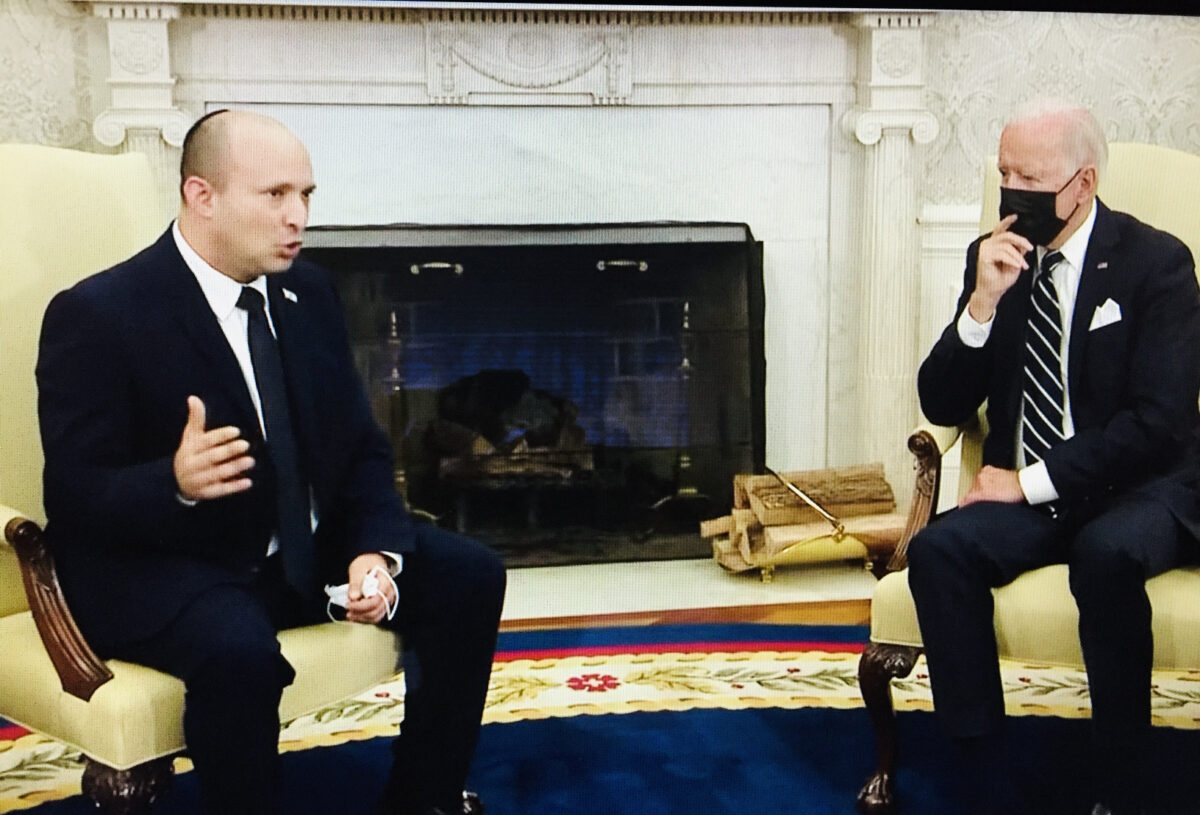Israeli Prime Minister Naftali Bennett, in his first direct meeting with U.S. President Joe Biden at the White House on August 27, predictably advanced a hardline approach toward Israel’s most deadly enemy, Iran.
Like his predecessor, Benjamin Netanyahu, Bennett tried to convince Biden that the best way forward is to impose a credible military threat against Iran while attempting to stymie its nuclear program.
In pursuing these related objectives, Bennett was only partially successful.
As widely expected, he failed to talk Biden out of trying to reenter the Iran nuclear agreement, from which his predecessor, Donald Trump, withdrew three years ago. But he convinced Biden to hold firm to his beliefs that Iran cannot be permitted to acquire a nuclear arsenal, and that Iran’s meddling in the Middle East threatens all its neighbors, including Israel.
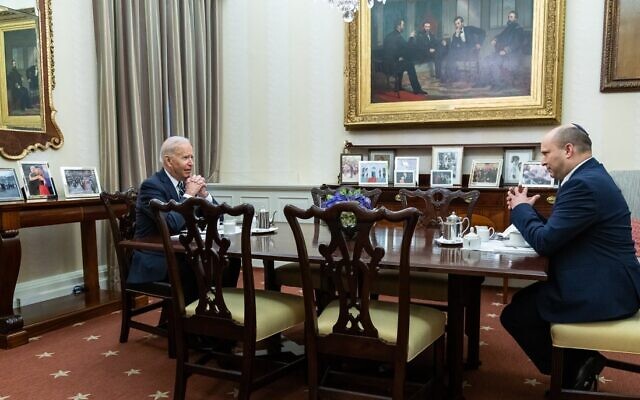
Biden, in his 50-minute conversation with Bennett, reiterated his view that Iran must “never” be able to develop a nuclear weapon.
However, Biden said he will continue with the diplomatic path in a bid to revive the accord, whose signatories are Iran, the United States, Russia, China, France, Britain and Germany. “We’re putting diplomacy first and seeing where that takes us,” he said. “But if diplomacy fails, we’re ready to turn to other options.”
Bennett, an opponent of the agreement from the moment it was signed in Vienna in the summer of 2015, thanked Biden for his assurance and his openness to non-diplomatic means to thwart Iran, the preeminent Shi’a Muslim nation in the Middle East.
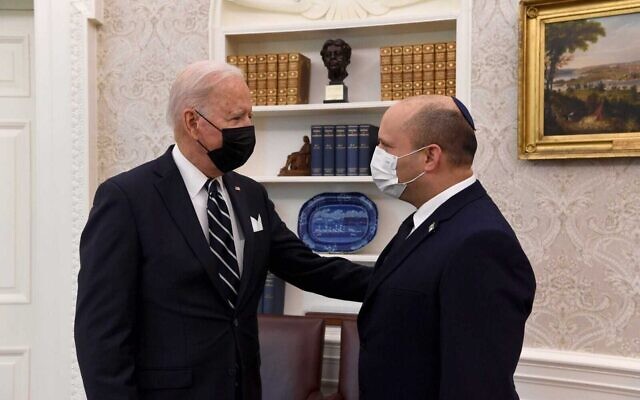
“The Iranians are spinning their centrifuges in Natanz and Fordow,” said Bennett in a reference to two of its uranium enrichment facilities. “We (have to) stop it, we both agree. So we’ve developed a comprehensive strategy that we’re going to be talking about with two goals. The first goal is to stop Iran on its regional aggression and start rolling it back into the box. And the second is to permanently keep Iran away from ever being able to break out the nuclear weapon.”
Bennett, in his talks with U.S. Secretary of Defence Lloyd Austin on August 26, reiterated that the Biden administration is committed to preserving Israel’s qualitative military advantage and ensuring that Israel “can defend itself against threats from Iran, its proxies, and terrorist groups.”

“Iran must be held accountable for acts of aggression in the Middle East and on international waters,” Austin added, referring to Iran’s political and military support of Hezbollah and Hamas and its stealth attacks on Israeli-managed ships in the region.
Austin said the United States is “committed to strengthening its strategic relationship with Israel” and guaranteeing “Israel’s security and its right of self-defence.”
In a nod to Washington’s annual $3.8 billion defence assistance package to Israel, Austin said, “This is unwavering, it is steadfast.”
And in another tangible expression of this commitment, Austin said that the United States, Israel’s chief ally, will replenish its depleted stock of Iron Dome interceptor missiles to the tune of $1 billion.
During the cross-border war in the Gaza Strip this past May, Israel intercepted scores of Hamas and Islamic Jihad rockets. Lately, incendiary balloons and rockets have been launched from Gaza, giving rise to media speculation that a new war could be imminent.
Prior to Bennett’s visit, Defence Minister Benny Gantz said that an enhanced “longer, stronger, broader” nuclear agreement, the current objective of the Biden administration, will be impossible to attain unless Iran faces the realistic threat of a military strike.
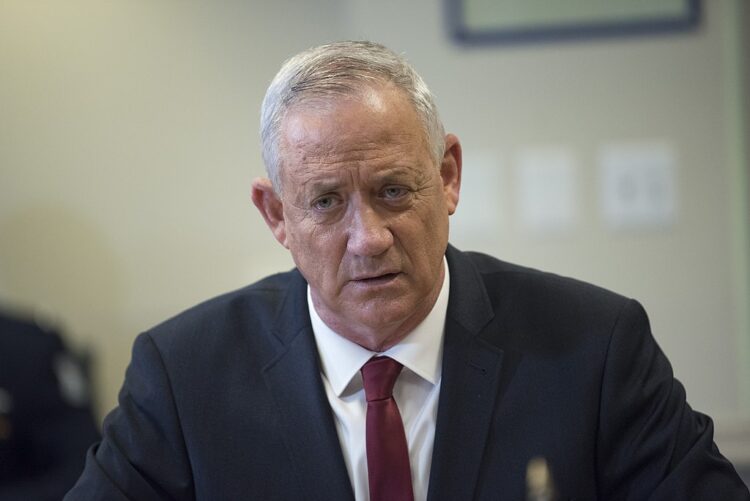
“The State of Israel has the means to act and will not hesitate to do so,” he told foreign diplomats. “I do not rule out the possibility that Israel will have to take action in the future in order to prevent a nuclear Iran.”
Claiming that Iran is “only two months away from acquiring the materials necessary for a nuclear weapon,” Gantz said, “We do not know if the Iranian regime will be willing to sign an agreement and come back to the negotiating table.”
He urged the international community to devise a viable Plan B “to stop Iran in its tracks toward a nuclear weapon.”
The chief of staff of Israel’s armed forces, General Aviv Kohavi, disclosed that Israel has accelerated its operational plans to bomb Iran’s nuclear sites.
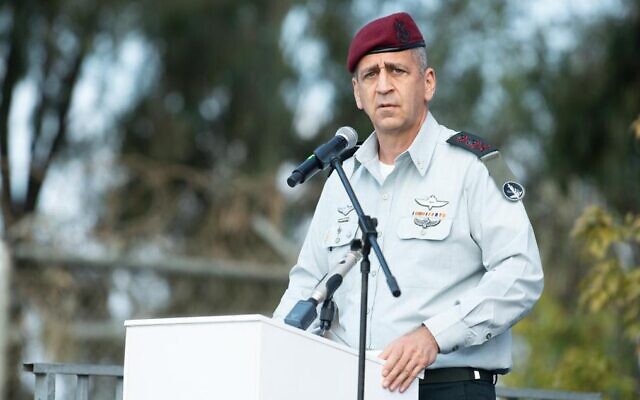
Referring to Israel’s current air campaign in Syria to degrade Iran’s bases and interdict Hezbollah arms convoys to Lebanon, Kohavi said that Israel is “operating constantly and in a variety of ways to minimize Iran’s influence in the Middle East.”
In July, Finance Minister Avigdor Liberman tabled an $18 billion defence budget for 2022, allocating $620 million for a possible confrontation with Iran.
A decade ago, Netanyahu designated $3 billion for such a scenario, but Israel stepped back from the brink.
